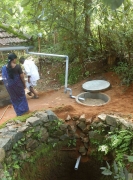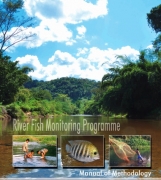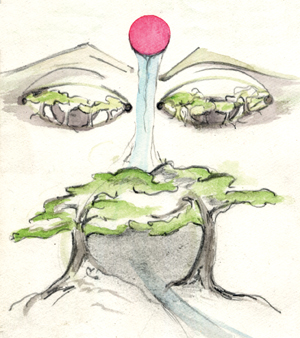News and Articles
Clean drinking water using low-cost purification plants - A case study from the work of IFMR Trust and WaterHealth India in Andhra Pradesh
Posted on 08 Jun, 2010 11:49 PMThis field report describes the work of WaterHealth India (WHI), in organising safe drinking water using low-cost water purification units, in several villages of Andhra Pradesh. The work was taken up with financial support from IFMR Trust.
Vinjinampadu village in Guntur district, Andhra Pradesh, is one of the villages where WHI worked to establish the unit. The village had lacked potable water supply, because of which its people suffered from a range of water-borne diseases. The situation was similar in many of the other villages in which WHI initiated this work.

Women empowerment - Jalswarajya project launches 'Jalmitra' initiative in Maharashtra
Posted on 08 Jun, 2010 08:54 PMWomen ‘JALMITRA’ spanning awareness on O&M
Article by - Prabhakar Mishra, IEC Specialist, Jalswarajya Nagpur.
Inroduction
Draft of “The Dam Safety Bill, 2010” approved
Posted on 08 Jun, 2010 06:24 PMAs per the Press Information Bureau's press release, the Union Cabinet has approved the proposal of the Ministry of Water Resources for enacting The Dam Safety Bill, on May 13 2010. The Bill is to be introduced in the Parliament.
The main objectives of the legislation are:-
• The new legislation will help the States in adopting uniform dam safety procedures which shall ensure safety of dams and safeguard benefits from such dams.
Dams on Himalayan rivers: How good is the science?
Posted on 08 Jun, 2010 05:38 PMThis brief article by Prof Jayanta Bandyopadhyay in the May 16-31 2010 issue of Business Economics magazine, highlights the recent plans of the central and state goverments of constructing a large number of dams on Himalayan rivers. Environmentalists continue to consistently argue against the construction of dams that are built without respect for ecological sciences and warn that this could lead to increase in disasters in the fragile Himalayan region.
"We have to accept diversity of knowledge to manage water wisely": Interview with Prof Jayanta Bandyopadhyay on business economics
Posted on 08 Jun, 2010 11:48 AMProf Jayanta Bandyopadhyay, Professor and Head, Centre for Development and Environment Policy, IIM Calcutta, speaks to Bappaditya Chatterjee of Business Economics , on the consequences of global warming and climate change on India's water resources, in the magazine's June 1-15 2010 issue.
Mazhapolima Participatory Well Recharge Programme - Concept Note and Process Document (2009)
Posted on 07 Jun, 2010 07:27 PM Mazhapolima is a community based well recharge programme, initiated by the Thrissur District Administration in collaboration with the Panchayat Raj Institutions in the District, and implemented by networking NGOs/CBOs, households, departments and agencies, research institutions, private sector and all other key stakeholders, who are either a water user or a water provider/planner.
Mazhapolima is a community based well recharge programme, initiated by the Thrissur District Administration in collaboration with the Panchayat Raj Institutions in the District, and implemented by networking NGOs/CBOs, households, departments and agencies, research institutions, private sector and all other key stakeholders, who are either a water user or a water provider/planner.
Diversity of approaches and implementation arrangements according to location specific needs centered on sustainable outcome and service levels are the underlying tenets of the programme. The programme envisages recharging of about 4.5 lakh open wells in the district to ensure sustainable access to water.
River Fish Monitoring Programme - Manual of Methodology by Kerala State Biodiversity Board
Posted on 07 Jun, 2010 03:33 PM Measurement of riverine biota, particularly benthic macroinvertebrates (such as crustaceans and aquatic insects) and fish, has become a widely accepted method of identifying the structural or functional integrity and the overall health of a riverine system. This manual from the Kerala State Biodiversity Board (KSBB), describes in detail the field procedures to be followed in such fish monitoring/measurement surveys, conducted for riverine ecological systems.
Measurement of riverine biota, particularly benthic macroinvertebrates (such as crustaceans and aquatic insects) and fish, has become a widely accepted method of identifying the structural or functional integrity and the overall health of a riverine system. This manual from the Kerala State Biodiversity Board (KSBB), describes in detail the field procedures to be followed in such fish monitoring/measurement surveys, conducted for riverine ecological systems.
KSBB has taken up this manual publication effort, in the conxtet of a state-wide fish monitoring programme, that aims to survey all the 44 rivers of Kerala with the involvement of resource persons from local colleges, research institutes, experts and fisherpeople community.
Safe drinking water for all using a portable low cost solar disinfection unit - A research paper
Posted on 07 Jun, 2010 02:23 PMThis paper by A Jagadeesh of RMK Engineering College, describes the design and testing of a portable, low-cost, and low maintenance solar disinfection unit, that can provide potable water. This system was tested with bore water, well as well as with waste water. In 5 hours, the unit eradicated 99.99% of the bacteria contained in the water samples.
This unit can provide about 6 liters of pure drinking water and larger units can be fabricated for providing safe drinking water at a community level.
In remembrance of water: How a conglomeration of mining companies, politicians and real estate developers are endangering the vast aquifers that give Goans their water
Posted on 07 Jun, 2010 01:00 PM Author: Hartman de Souza Art: Jessica Schnabel Content Courtesy: Himal Southasian
Author: Hartman de Souza Art: Jessica Schnabel Content Courtesy: Himal Southasian
Where there is water, there is probably ore beneath.
Having trekked several times to Paikdev’s spring to gulp water pouring out of the moss-covered iron mouth, one would think the mysteries of the journey would fade. But, if anything, they have become more poignant – sitting here at this shrine to the snake deity of the Velip community in the village of Maina, in Goa’s Quepem District. It is here, amidst thousands of hectares of rolling forests, in the foothills of the Western Ghats, home to countless perennial springs and streams, wildlife and more, that a strange conglomeration of mining companies, politicians and real-estate developers are sharpening their collective sword. These activities were already afoot a year ago, with mining operations systematically destroying forests, because, as the government in Panjim stated at the time, the iron ore was needed by New Delhi to keep its nine-percent growth rate on track. This year, the message is no different.
Resource guide on mainstreaming gender in water management for India - Regional language guide hardcopies and CDs available from CEE Lucknow
Posted on 07 Jun, 2010 12:56 PMCentre for Environment Education (CEE), Northern regional office based in Lucknow has been working with Gender and Water Alliance (GWA) for trans-adapting the resource guide on ‘Mainstreaming Gender in Water Management’ in Hindi for India as part of the South Asia version. The Resource guide was first published by the United Nations Development Programme (UNDP) in 2003. This is the second edition of the Resource Guide on Mainstreaming Gender in Water Management of August 2006.